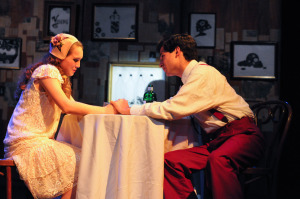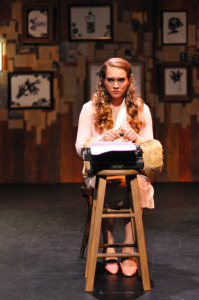
“Machinal” (adj.): Of or relating to machines; mechanical.
The TAPS production of Sophie Treadwell’s 1928 play this past weekend at the Nitery Theater was indeed mechanical — well-executed and smartly designed. Directed by Sammi Cannold ’16 and produced by Christina Medina ’15 as her senior project for TAPS, the show efficiently tells the story of a woman, Helen Jones (Elisa Vidales ’18), accused of murdering her husband and the path that led her there. Often symbolic rather than personal, we understand Helen’s journey intellectually without necessarily connecting emotionally.
Cannold’s production is sharply and precisely staged, skillfully using the space to tell the story. In a smart and effective move, she intersperses the final courtroom scenes throughout the play, staging them as if the audience were the jury. It’s a strong visual choice, although it continues to draw us into the show in a cerebral, not visceral, manner.

While the actors do a fine job – it’s a very solid ensemble cast – we never really emotionally connect to the characters. Many of them, particularly the expressive Vidales, have impassioned moments of high intensity, which we observe as disconnected outsiders. Still, the actors really succeed in capturing each character’s specifics and idiosyncrasies. Vidales captures Helen’s nervous actions – like constantly adjusting her hair – and hurried speech in stream-of-consciousness monologues. Medina does an admirable job as Helen’s mother, and with the amount that the character is mentioned in the play, we’re left hoping for another scene with her in it. Sebastian Sanchez-Luege ’17 is well-cast as the fast-talking, corporate, wealthy George H. Jones, although he’s never as revolting to us as Helen seems to think he is. Indeed, Helen’s disproportionate disgust toward him, or her saying, “I’ll kill you,” to her mother, both represent the many times we don’t quite see a reason she became this way. There isn’t enough provocation from those characters for us to truly understand her, and perhaps this is partially responsible for our difficulty in empathizing.

Helen’s search for freedom manifests itself in Richard (Ian Anstee ’18), a lover who acts more as an emblem of freedom than as a viable partner. Anstee does a great job as this smooth gentleman who becomes Helen’s lover, garnering some of the biggest laughs of the night with his ridiculous lines. Helen’s and Richard’s interactions together are exciting to watch, but also slightly dark, as we see him unintentionally planting ideas that Helen later uses when murdering her husband. Their unequal levels of investment in the relationship are clear from the start, and we’re not surprised when he eventually betrays her.

Most aspects of this production were very well done. Madelaine Bixler’s ’17 set design is spot-on for the show, complete with an intriguing background and ever-shifting furniture. The set for each scene successfully creates a new and separate world from the other scenes, from the bedroom, to the courtroom, to the office. Reno Tsosie’s ’15 costume design is wonderful, placing us firmly in the 1920s while also delighting us with everything from gorgeous dresses, to red suits, to nightgown slips. The transitions between scenes could have been smoother had music been used to cover the sounds of the actors shuffling, but these were still efficiently staged, with the actors walking in grid-like patterns to bring out set elements.
Ultimately, the production does a fine job in its execution, but we leave without knowing entirely why the story was told or having particularly strong feelings for any of the characters or their fates. Still, “Machinal” had many distinct moments showcasing the theatrical talent on this campus, leaving us with the sharp and intriguing images that function as the mechanics of this thoughtful story.
Contact Noemi Berkowitz at noemi11 “at” stanford.edu.
